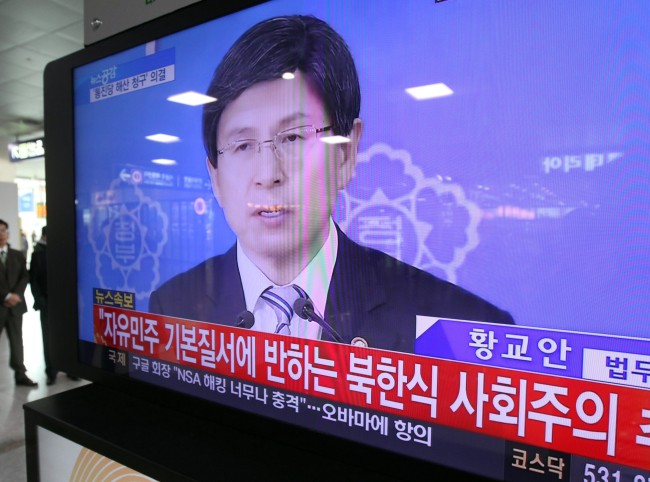 |
정부의 통합진보당 해산심판 청구안이 국무회의를 통과한 5일, 황교안 법무부 장관이 정부서울청사에서 이와 관련한 브리핑을 하고 있다. 법무부는 이날 오전 국무회의에 긴급 안건으로 '위헌 정당 해산 심판 청구의 건'을 상정했다. (연합뉴스) |
<관련 영문 기사>
Government files for dissolution of Unified Progressive Party
By Choi He-suk
The government on Tuesday petitioned to the Constitutional Court to dissolve the minor Unified Progressive Party accusing it of pro-North Korean activities.
The Justice Ministry also plans to push for disqualifying its six lawmakers and prohibiting the leftist party from all political activities,
The unprecedented move follows a prosecution investigation into UPP lawmaker Lee Seok-ki and other members arrested in August on charges of treason.
“It has been concluded that the UPP’s purpose contradicts the ideals of the Constitution, and the activities of the Revolutionary Organization follow North Korea’s strategy for anti-South revolution,” Minister of Justice Hwang Kyo-ahn after the Cabinet meeting which approved the decision.
The RO is alleged to be an anti-government organization formed by Rep. Lee Seok-ki in laying out the revolt plot. Lee and a number of UPP-linked individuals were arrested in August on charges of treason and are awaiting trial.
The Justice Ministry claims that North Korea was closely involved in the formation of the UPP, and that if its presence is allowed to continue the party could endanger South Korea’s existence in collaboration with North Korea.
For the motion to be approved, six or more of the Constitutional Court’s justices need to give their approval within 180 days. If ruled unconstitutional, the UPP will become the first political party to be forcefully dissolved since 1958. At the time, the Progressive Party led by Cho Bong-am, a strong challenger to then-President Syngman Rhee, was dissolved after he was arrested on charges of espionage and violating the National Security Act.
The government’s move has been met with fierce criticism from the UPP.
“The plot to remove the UPP with a dead legal clause about party disbandment is reversing the advancement of democracy in Korea to the Yushin era,” UPP chairwoman Lee Jung-hee said.
Saying that the “specter of Yushin” has been raised, Lee went on to say that President Park Geun-hye was acting to “crush democracy and to mutilate justice.”
Yushin refers to the Yushin Constitution that was introduced in 1972 and designed to allow late President Park Chung-hee extend his term. Park, who was assassinated in 1979 after holding power for 18 years, was President Park Geun-hye’s father.
“The public is aware that the series of actions that led to the attempt to dissolve the UPP are aimed that putting the people’s criticism of the illegitimate administration and the power ceased through injustice,” she said.
As the UPP flares up, the main opposition Democratic Party appears to be taking a cautious approach to the issue, saying only that it hoped for “wise decision” from the justices.
Since the presidential election, the DP has been distancing itself from the UPP in an apparent move to guard itself from the possible fallout from the investigation into Lee Seok-ki.
Although the DP has had no official link to the UPP for some time, the ruling Saenuri Party has blamed the DP-UPP alliance formed during last year’s general elections as having provided the minor opposition a way into the parliament.
As expected, the move was welcomed by the Saenuri Party, whose lawmakers had pushed to removed Lee Seok-ki and Rep. Kim Jae-yeon from the parliament.
“A party that disregards Korea’s Constitution and laws cannot be protected by the Constitution. Requesting UPP’s dissolution is an unavoidable choice to defend Korea and Korea’s Constitution,” Saenuri Party deputy floor leader Rep. Yoon Sang-hyun said.
(cheesuk@heraldcorp.com)




![[Herald Interview] 'Trump will use tariffs as first line of defense for American manufacturing'](http://res.heraldm.com/phpwas/restmb_idxmake.php?idx=644&simg=/content/image/2024/11/26/20241126050017_0.jpg)

![[Health and care] Getting cancer young: Why cancer isn’t just an older person’s battle](http://res.heraldm.com/phpwas/restmb_idxmake.php?idx=644&simg=/content/image/2024/11/26/20241126050043_0.jpg)
